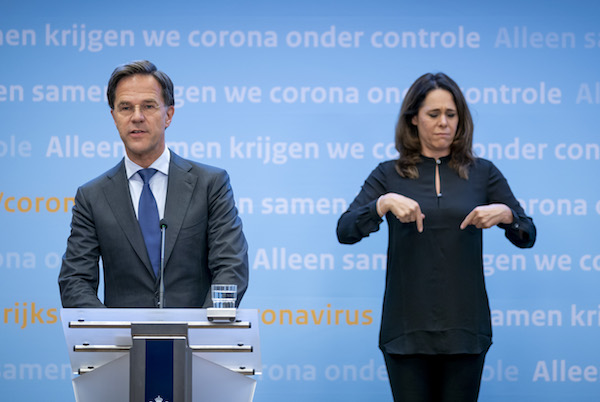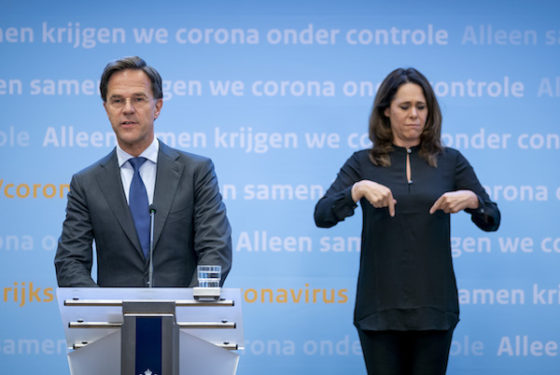Dutch give green light for events, sports and sex – but 1.5 metres remains crucial


The Netherlands will take a major step towards returning to ‘normal’ on July 1, with new rules for cafes, cinemas and events – and major changes to the situation on public transport.
In addition, football stadiums will reopen to fans, as long as social distancing rules apply, and sex workers will be able to start working again.
Outlining the changes, some of which had been leaked in advance, prime minister Mark Rutte said that the most important statistics about the coronavirus show it is stable and low, or still declining.
‘The positive news is that we can do more than we had expected [from July 1],’ Rutte said. ‘By keeping our distance from each other, we have given ourselves more room.’ All research, he said, shows that 1.5 metres is crucial.
The rules – washing your hands, working from home and keeping your distance – remain paramount, as does staying at home if you have symptoms, Rutte said. But it will require more self discipline to keep to the new rules, the prime minister said.
Asked about the determination to keep the social distancing rules, despite growing opposition, Rutte said sticking to 1.5 metres is crucial. ‘I am not going to beg people to do it,’ he said. ‘But I do think we are responsible enough, and adult enough to do this.’
The main changes from July 1:
- The 1.5 metre social distancing rule will no longer apply on public transport – as long as people are seated – but masks will remain compulsory.
- People can also sit next to each other in coaches and non-family groups can travel in the same car.
- Outdoor events will no longer have a maximum number of visitors as long as social distancing is observed and people are seated. Festivals will depend on local authority licences so it is unlikely these will resume before mid August.
- Indoor events have a limit of 100 people excluding staff. Seating is compulsory.
- Stadiums such as the Kuip and Arena can reopen for events, as long as people keep 1.5 metres distance and do not sing or chant.
- Secondary schools will be able to give traditional lessons, and pupils will no longer have to keep 1.5 metres from each other. However, they should still keep 1.5 metres from teachers.
- Universities and colleges can also restart physical lessons but social distancing will apply. In effect, this is unlikely to happen until the next academic year, Rutte said.
- Cafe terraces can ditch the 1.5 metre rule between tables, if they place protective screens instead.
- Sex workers can start work again.
- Sports schools and gyms can reopen, and competitive sports can also resume.
- The limit on visits to people in nursing homes is also being lifted.
- However, night clubs and discos remain closed and singing in large groups, including in churches, remains banned because of the risk of infection.
Rutte said that the long list of new measures shows that the end of the road map has been reached earlier than expected – July 1 instead of September 1. ‘But we must continue to keep a close eye on developments,’ he said. ‘We will have more freedom than we expected.’
Health minister Hugo de Jonge said that the Netherlands must continue to do everything it can to keep a second wave at bay. ‘We can be done with the virus but the virus is not done with us,’ he said.
‘We should liken this to our centuries-old battle against the sea,’ he said. ‘We are only really protected if there is a vaccine.’
De Jonge also urged everyone who has symptoms to come forward for testing. One in 10 people who are identified via the track and trace system are found to have coronavirus, he said.
The app which is currently being worked on will be ready for testing in a couple of weeks and then it will be decided about how it should be implemented, he said.
The government will next review the rules ahead of September 1.
Thank you for donating to DutchNews.nl.
We could not provide the Dutch News service, and keep it free of charge, without the generous support of our readers. Your donations allow us to report on issues you tell us matter, and provide you with a summary of the most important Dutch news each day.
Make a donation